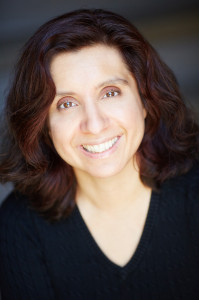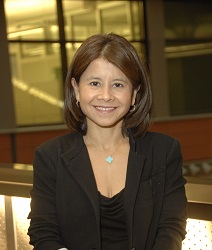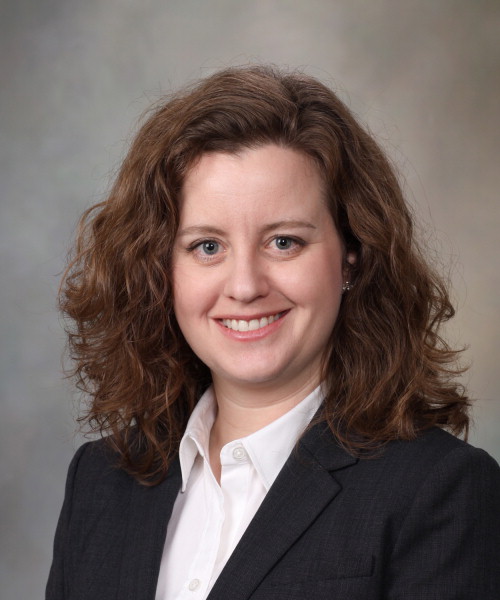WIR MEMBER SPOTLIGHT
Women in Rhinology was featured in a recent Women in Otolaryngology electronic newsletter by highlighting 3 WiR members that helped to kick off the creation of WiR. See their "bios" below as featured in the newsletter.
AYESHA N. KHALID, MD, MBA
Watertown, MA
 I was born in New York City, was raised in Montreal, Canada, and have also lived in New York and Pennsylvania. I consider myself a New Yorker first, but many of my health policy viewpoints and my accent betray my Canadian upbringing, eh? I was born in New York City, was raised in Montreal, Canada, and have also lived in New York and Pennsylvania. I consider myself a New Yorker first, but many of my health policy viewpoints and my accent betray my Canadian upbringing, eh?
David Rosenblatt, MD, research mentor at McGill University and my mom, Nazneen Khalid, were my biggest influences in deciding to become a physician. David Kennedy, MD, with whom I did research as a medical student, was my strongest influence in deciding to become an otolaryngologist. Drs. David Kennedy, Bill Bolger, and Joel Perloff influenced my decision to pursue fellowship training in Rhinology; and I am glad I did.
Tim Smith, MD, my fellowship director, taught me what the highest level of surgery and patient care looks like. Tim always said that every error is a learning opportunity. Rather than discouraging us, he motivated us to learn from our mistakes and move on. He also has a great sense of humor and is someone who treats his fellows like his children.
I am in a hospital-employed practice at Cambridge Health Alliance with both a salary and productivity incentive similar to a private practice. I have an academic appointment at Harvard Medical School.
My main passions outside of surgery are digital healthcare innovation and improving the mark on patient engagement. These interests developed during my full-time pursuit of an MBA at MIT where I met health technology entrepreneurs. I believe that divisiveness among physicians is the foremost challenge our specialty currently faces.
The founders of the Women in Rhinology initially met informally after several meetings. Amber Luong, MD, and I called women to action one evening after realizing few of us were ever at the podium. We formalized our group a few years ago, and the rest is history.
Women’s issues affect the entire specialty, not just women in rhinology. The better women do, the better otorhinolaryngology does. Keeping our female physicians happy and engaged is part and parcel of success for our patients, especially as women physicians have the highest rate of suicide- a sad testament to our house of medicine.
I think the biggest advantage of working as a group of women, both for ourselves and our field, is emotional and leadership support to get things done, such as promoting each other for leadership positions and advancing ourselves personally and professionally.
AMBER U. LUONG, MD, PHD
Houston, TX
 I was born in Vietnam and came to the United States at age three. My family, including my parents and a younger brother who is now a lawyer in Houston, was among the lucky refugees of the Vietnam War who were “adopted” by a Baptist church in San Antonio, TX. I still keep in touch with many of the families from that church, and I will always feel indebted to them for their kindness. I was born in Vietnam and came to the United States at age three. My family, including my parents and a younger brother who is now a lawyer in Houston, was among the lucky refugees of the Vietnam War who were “adopted” by a Baptist church in San Antonio, TX. I still keep in touch with many of the families from that church, and I will always feel indebted to them for their kindness.
My dad strongly encouraged me to go into medicine at a very young age. My graduate school mentors, Drs. Michael Brown and Joseph Goldstein, influenced my decision to become a physician-scientist as working directly with them allowed me to see how their research could benefit thousands of patients’ lives. It was both awe- inspiring and an opportunity of a lifetime. Nobel Laureate Michael Brown was one of my most influential mentors early in my academic life. He impressed me with his amazing intellect and his ability to see the important big picture. I wanted to have a similar career. A friend, Mickie Cheng, who was enrolled in the MD- PhD program with me, encouraged me to look into OTO-HNS because she felt it would give me the time to pursue a research and clinical career. She was right!
I am in an academic practice at McGovern Medical School in Houston with a 50-50 research to clinical practice ratio. This allows me to run a basic science lab while also seeing patients in the clinic and OR. Outside of work, my three kids are my main passion. I have a 7-year-old and a set of 3-year-old twins. It’s amazing how quickly they grow and learn to understand the world around them.
The biggest challenge for our specialty will be to navigate the rapidly changing healthcare environment. Individually, the biggest challenge I see for all physicians is to remain passionate for medicine and compassionate for our patients. The constant stresses brought on by ongoing healthcare transitions make it difficult to keep these feelings alive on a daily basis.
Women in Rhinology (WiR) emerged from informal gatherings of several women American Rhinologic Society (ARS) members at ARS meetings. We all noticed the need for diverse representation within the organization. I mobilized this interest initially with more formal meetings that included speakers who discussed women in rhinology and topics such as negotiation, leadership, and implicit bias. The ARS leadership formally recognized and supported the creation of WiR. The greatest advantage of working as a group of women is our mutual and implicit understanding of shared career- and family- related experiences. Although our personal goals may be quite diverse, the WiR facilitates a collaborative and supportive means of obtaining resources to acknowledge and address common career and family challenges.
I recruited several recognized women ARS leaders, including Ayesha N. Khalid, MD, MBA, to help coordinate women’s events at ARS meetings. With a newly attained MBA, Ayesha’s amazing organizational skills have been a great asset. Other women ARS leaders have advanced early WiR initiatives including the leadership award and gender-specific research on management of chronic rhinosinusitis.
Our short-term goals are to bring recognition to women ARS members and their work, and to provide leadership resources to all ARS members. Our long-term goals are to support career development of women rhinologists including their representation within ARS and AAO-HNS leadership, and to draw attention to gender-specific issues in the practice of Rhinology.
ERIN K. O’BRIEN, MD
Rochester, MN
 I work in an academic setting at Mayo Clinic in Rochester, MN. I chose this practice for the opportunity to see the most complex cases and work with experts in otolaryngology, pulmonology, allergy and immunology. We have a team approach at the Mayo Clinic that provides excellent care to patients and makes my job more fulfilling and enjoyable. I work in an academic setting at Mayo Clinic in Rochester, MN. I chose this practice for the opportunity to see the most complex cases and work with experts in otolaryngology, pulmonology, allergy and immunology. We have a team approach at the Mayo Clinic that provides excellent care to patients and makes my job more fulfilling and enjoyable.
I grew up in Indianapolis, IN. I went to medical school in Pittsburgh, PA, close to the small steel town where my dad grew up. Since matching at Iowa for residency, I have remained in the Midwest (Omaha, NE; Iowa City, IA; and Rochester MN).
I debated becoming a research scientist versus becoming a physician while in college. My favorite biology professor in college, Wade Hazel, MD, actually discouraged me from going to medical school because he knew I hated memorizing. I was a T32 resident* (see editor’s note below), am very involved in research and still publishing, so I'm still a scientist even though my primary job is patient care.
There were a number of great women in the department of Otolaryngology at the University of Pittsburgh (Drs. Jennifer Grandis, BJ Ferguson, the female residents at Pitt), so I could see myself in the role of an academic otolaryngologist. Watching Eugene Myers, MD, do a neck dissection as a medical student was an amazing experience.
I had the opportunity to attend the American Academy of Otolaryngic Allery (AAOA) basic allergy course as a junior medical student, and I enjoyed sinus surgery. I was able to do many rhinology cases with Rick Rinehart, MD, in Des Moines, IA, and worked with a great neurosurgeon there, Jeremy Greenlee, MD, who was doing many skull base cases endoscopically.
Right now I'm very involved in diversity and inclusion (D&I) as the D&I leader for my department as we encourage both among our physicians, staff, and patients.
As a rhinologist, I consider antibiotic overuse and lack of understanding about the appropriate treatment of sinus complaints, regardless of the source, to be big challenges. We need to better educate the public, other providers, and medical students about sinusitis. I'm also concerned about inappropriate surgical intervention for sinus symptoms.
Women started getting together informally at the end of American Rhinologic Society (ARS) meetings. What started as a group of us meeting at the bar turned into lunches or breakfast forums and networking events sponsored by the ARS. Some of the men in the ARS leadership are very supportive of our efforts to ensure that women are represented in meeting organization, on panels, and on committees.
The biggest advantages of working as a group of women, both for individuals and one’s (sub) specialty, is getting the attention of the leadership through our collaboration. They are now more aware that we want to be included in the meetings and on the Board. It is also more apparent when women are not included. There are gender differences in some disease processes within the field of rhinology, and recognition of those differences is critical to research and patient care.
The ARS is very important to most academic rhinologists. Being asked to participate in meetings and in leadership is a part of getting promoted at our home institutions. Facilitating collaborative research opportunities, idea exchange, promotion of young women rhinologists, and recognition of senior women rhinologists’ expertise are all important.
|

 I was born in New York City, was raised in Montreal, Canada, and have also lived in New York and Pennsylvania. I consider myself a New Yorker first, but many of my health policy viewpoints and my accent betray my Canadian upbringing, eh?
I was born in New York City, was raised in Montreal, Canada, and have also lived in New York and Pennsylvania. I consider myself a New Yorker first, but many of my health policy viewpoints and my accent betray my Canadian upbringing, eh? I was born in Vietnam and came to the United States at age three. My family, including my parents and a younger brother who is now a lawyer in Houston, was among the lucky refugees of the Vietnam War who were “adopted” by a Baptist church in San Antonio, TX. I still keep in touch with many of the families from that church, and I will always feel indebted to them for their kindness.
I was born in Vietnam and came to the United States at age three. My family, including my parents and a younger brother who is now a lawyer in Houston, was among the lucky refugees of the Vietnam War who were “adopted” by a Baptist church in San Antonio, TX. I still keep in touch with many of the families from that church, and I will always feel indebted to them for their kindness. I work in an academic setting at Mayo Clinic in Rochester, MN. I chose this practice for the opportunity to see the most complex cases and work with experts in otolaryngology, pulmonology, allergy and immunology. We have a team approach at the Mayo Clinic that provides excellent care to patients and makes my job more fulfilling and enjoyable.
I work in an academic setting at Mayo Clinic in Rochester, MN. I chose this practice for the opportunity to see the most complex cases and work with experts in otolaryngology, pulmonology, allergy and immunology. We have a team approach at the Mayo Clinic that provides excellent care to patients and makes my job more fulfilling and enjoyable.